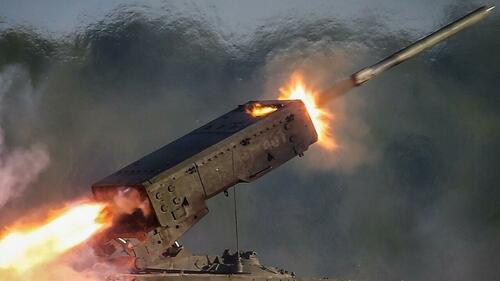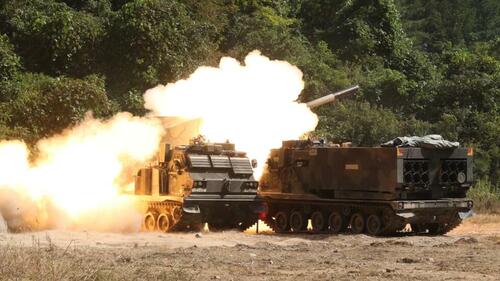
Authored by by Kyle Anzalone & Will Porter via The Libertarian Institute,
President Joe Biden is resisting demands from Kiev to supply long-range rocket launchers to the Ukrainian military, Politico reported, suggesting the White House is concerned the weapons could be used for strikes inside Russia.
Ukrainian officials have requested increasingly advanced weaponry from Washington in recent months – even before Moscow’s invasion commenced earlier this year – and are currently urging the US government to send M270 Multiple Launch Rocket Systems (MLRS), among other hardware.

While Biden was reportedly willing to consider the request during a trip to Germany last month, where dozens of countries met to discuss aid for Ukraine, a congressional staffer told Politico the plan is not moving forward.
"There was momentum on it at Ramstein, but that seems to have cooled," they said, adding that "There’s definitely a frustration building" among officials in Kiev over a perceived reluctance to send heavier arms.
The staffer did not offer a reason for the change of heart, but according to three other sources cited by the outlet, Kiev believes the White House is "holding back over worries the weapon could be used to launch strikes inside Russia, thereby expanding and prolonging the conflict."
Though the war raging in Eastern Europe has largely been confined to Ukrainian territory and separatist-controlled areas in the Donbass region, a number of mysterious blasts have erupted on Russian soil over the last month, including in the Belgorod, Kursk and Bryansk regions bordering Ukraine. Kiev has stopped short of taking credit for the apparent attacks, but US officials have confirmed that Ukrainian forces were behind at least one of the incidents.
Depending on the munitions used, the M270 MLRS has a range of between 20 and 40 miles, though more advanced rockets can travel up to 100 miles, potentially putting them far beyond the range of the American M-777 Howitzers supplied to Ukraine in recent weeks. Even with special rocket-assisted rounds, the latter artillery pieces have a maximum range of just over 18 miles. The M270 is also a self-propelled platform and was specifically designed to evade Russian artillery strikes, capable of rapidly firing up to 12 rockets before moving to a new position.

Washington has sent billions of dollars in weapons to Ukraine since the Russian invasion began in late February, including attack helicopters, artillery, tank-killing Javelin missiles and Stinger anti-aircraft platforms. Moreover, a massive new aid package currently moving through the Senate will bring total US assistance since March to nearly $54 billion if passed, much of it devoted to arms and other military gear.
Despite the complaints from Ukrainian officials, however, Under Secretary of State for Political Affairs Victoria Nuland recently suggested Kiev may be receiving US-made multiple-launch rockets after all, telling European Pravda in April that “we already supply MLRS systems.” The comments prompted speculation that Washington could be sending the M142 HIMARS, a lighter-weight, wheeled variant of the M270. President Volodymyr Zelensky has repeatedly mentioned both systems by name in public appeals for additional armaments.
An unnamed White House official cited by Politico also indicated that Biden’s reluctance to send the M270 did not mean a final decision had been made, stating that Washington and Kiev are still “in active discussion” about the weapon.
Authored by by Kyle Anzalone & Will Porter via The Libertarian Institute,
President Joe Biden is resisting demands from Kiev to supply long-range rocket launchers to the Ukrainian military, Politico reported, suggesting the White House is concerned the weapons could be used for strikes inside Russia.
Ukrainian officials have requested increasingly advanced weaponry from Washington in recent months – even before Moscow’s invasion commenced earlier this year – and are currently urging the US government to send M270 Multiple Launch Rocket Systems (MLRS), among other hardware.

While Biden was reportedly willing to consider the request during a trip to Germany last month, where dozens of countries met to discuss aid for Ukraine, a congressional staffer told Politico the plan is not moving forward.
“There was momentum on it at Ramstein, but that seems to have cooled,” they said, adding that “There’s definitely a frustration building” among officials in Kiev over a perceived reluctance to send heavier arms.
The staffer did not offer a reason for the change of heart, but according to three other sources cited by the outlet, Kiev believes the White House is “holding back over worries the weapon could be used to launch strikes inside Russia, thereby expanding and prolonging the conflict.”
Though the war raging in Eastern Europe has largely been confined to Ukrainian territory and separatist-controlled areas in the Donbass region, a number of mysterious blasts have erupted on Russian soil over the last month, including in the Belgorod, Kursk and Bryansk regions bordering Ukraine. Kiev has stopped short of taking credit for the apparent attacks, but US officials have confirmed that Ukrainian forces were behind at least one of the incidents.
Depending on the munitions used, the M270 MLRS has a range of between 20 and 40 miles, though more advanced rockets can travel up to 100 miles, potentially putting them far beyond the range of the American M-777 Howitzers supplied to Ukraine in recent weeks. Even with special rocket-assisted rounds, the latter artillery pieces have a maximum range of just over 18 miles. The M270 is also a self-propelled platform and was specifically designed to evade Russian artillery strikes, capable of rapidly firing up to 12 rockets before moving to a new position.

Washington has sent billions of dollars in weapons to Ukraine since the Russian invasion began in late February, including attack helicopters, artillery, tank-killing Javelin missiles and Stinger anti-aircraft platforms. Moreover, a massive new aid package currently moving through the Senate will bring total US assistance since March to nearly $54 billion if passed, much of it devoted to arms and other military gear.
Despite the complaints from Ukrainian officials, however, Under Secretary of State for Political Affairs Victoria Nuland recently suggested Kiev may be receiving US-made multiple-launch rockets after all, telling European Pravda in April that “we already supply MLRS systems.” The comments prompted speculation that Washington could be sending the M142 HIMARS, a lighter-weight, wheeled variant of the M270. President Volodymyr Zelensky has repeatedly mentioned both systems by name in public appeals for additional armaments.
An unnamed White House official cited by Politico also indicated that Biden’s reluctance to send the M270 did not mean a final decision had been made, stating that Washington and Kiev are still “in active discussion” about the weapon.





